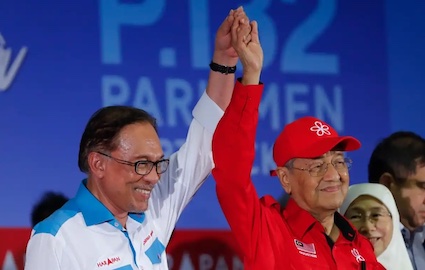Anwar, Mahathir and Daim supported “bailouts” when they were in power

In November 2000, Asiaweek came out with a report on bailouts involving Mahathir, Anwar, and Daim (which you read below). In fact, Petronas was used many times for all these bailouts — and twice in the past Petronas had to bail out Bank Bumiputra to prevent it from collapsing.
NO HOLDS BARRED
Raja Petra Kamarudin
Tun Dr Mahathir Mohamad and Anwar Ibrahim are attacking the government for what they say is a bailout of Sapura Energy. Yet, when they were in power, the government was involved in many bailouts — against the backdrop of what Anwar would say “no forensic audit” being conducted.
In November 2000, Asiaweek came out with a report on bailouts involving Mahathir, Anwar, and Daim Zainuddin (which you read below). In fact, Petronas was used many times for all these bailouts — and twice in the past Petronas had to bail out Bank Bumiputra to prevent it from collapsing.
The biggest “backdoor” bailout is Proton. To prevent Proton from collapsing, the government made other brands more expensive by imposing a high tax on non-Proton cars. Hence, by comparison, Proton became cheaper to the non-Proton cars.
In the end, the non-Proton car buyers are bailing out Proton by paying more for non-Proton cars. Billions every year is being taken from car buyers to prevent Proton from going under.
The second controversial bailout involved Bank Negara Malaysia. Bank Negara had lost RM31.5 billion gambling on the FOREX market, and to recover this huge loss, the government “sold” MAS to Tajudin Ramli. But it was a fake sale merely to create a “paper profit” to offset against Bank Negara’s REAL loss (not “paper loss” as Anwar told Parliament in 1993) of RM31.5 billion.
*********************************************************************************
By Assif Shameen, Asiaweek, November 2000
When is a bailout not really a bailout? When top officials say it is not. Former finance minister Daim Zainuddin, a close friend and associate of Prime Minister Mahathir Mohamad, says “a bailout is when state funds are used to rescue someone.” No state funds have been used, nor will they, he promises. Anwar Ibrahim, Daim’s successor in Finance and also the deputy PM, seems to feel the same way. He said March 16 that “the government’s task is not to bail out individual companies, but to bring back confidence through consistent policies.”
Yet recent transactions to help businessmen in distress cannot be described as anything but bailouts. They may not have relied on state funds, but they have involved state-controlled agencies and regulatory bodies.
The biggest and most controversial deal so far is the apparent rescue of Mahathir’s eldest son, the once fast-rising Mirzan, 39, and his floundering shipping empire. State oil corporation Petronas — which the PM oversees — announced on March 6 a complex deal for Mirzan’s businesses. Petronas will buy out state-affiliated Malaysian International Shipping Corp., which in turn will purchase Mirzan’s Hong Kong company, Pacific Basin Bulk Shipping, and part of his Kuala Lumpur-based Konsortium Perkapalan, which does shipping and haulage.
Petronas and MISC have not put a price on their acquisitions, but Mirzan already has said the deal will wipe out some $420 million in debts. Several cabinet members are alarmed by the transaction. “I thought such things could only happen in Indonesia or some African country,” says an UMNO leader. Mirzan, for his part, told reporters: “I don’t think it is a bailout. It’s only a bailout if you say so.”
Let’s say so. The Mirzan bailout came just a day after the government announced that two large banks — premier blue chip conglomerate Sime Darby’s Sime Bank and state-owned Bank Bumiputra — would need help. They suffered $600 million in losses from bad loans to well-connected corporations. The government is pumping $190 million into Bank Bumiputra (which has been rescued twice before with government funds, at a total cost of about $2 billion.) Meanwhile, Sime Bank was taken over by RHB Bank, part of stockbroker Rashid Hussain’s growing financial services empire. For rescuing troubled Sime Bank, RHB Bank’s holding company may receive a cash injection from the state-controlled Employees Provident Fund.
Another intriguing deal was United Engineers Malaysia’s purchase of an additional stake in its beleaguered parent company, Renong, one of Malaysia’s largest conglomerates with interests in construction, oil and gas, telecommunications, property development and finance. Though Renong is controlled by tycoon Halim Saad, many believe he holds those shares as a nominee for UMNO or its leaders — which UMNO treasurer Daim denies. The deal was particularly controversial because UEM received a waiver from regulatory bodies that, in effect, shortchanged Renong’s minority shareholders. Insiders say Finance Minister Anwar was out of the loop on this rescue, and perhaps on others too. So, who is calling the shots on the bailouts?
http://edition.cnn.com/ASIANOW/asiaweek/98/0327/cs2.html

